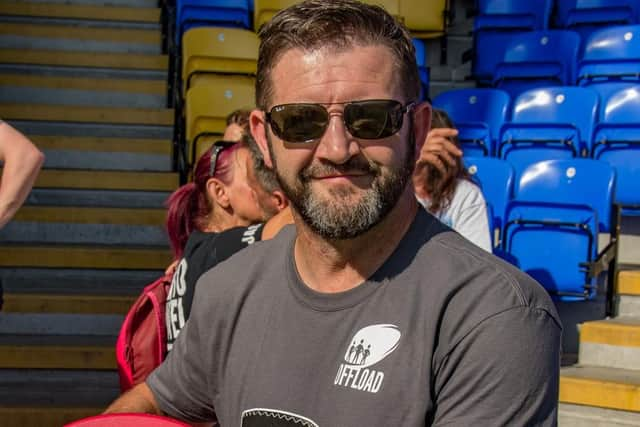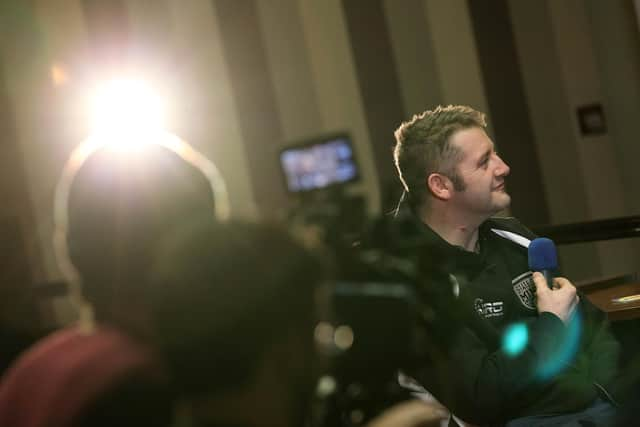'I thought I don’t really want to be here' - Former rugby league player Jimmy Gittins on how talking helped his mental health
“Given my prognosis, life wasn’t particularly very bright for me,” he reflects, “and I thought I don’t really want to be here.
" It wasn’t how I saw my life. At 28 years of age I never did envisage that I’d be laid in a hospital bed where everything had to be done for me.”
Advertisement
Hide AdAdvertisement
Hide AdLooking back, Jimmy, who lives in Wakefield, says talking about emotions and feelings has been key in his recovery.


With the support of family and friends, he pulled himself out from that lowest point. “Sitting down with my dad, with my mum, with my brother and friends and just talking about how I felt, and our emotions – and sometimes it was hard and we’d all be crying – put us all on a level that we could understand.
“When one person is low and down, it’s actually not just them it’s affecting, the chances are there’s a ripple effect on people who are worried and concerned about them.
And for me talking was the best therapy I’ve ever had. The ability to talk about emotions and feelings has certainly been the catalyst of my recovery.”
Advertisement
Hide AdAdvertisement
Hide AdNine months after sustaining his injury whilst playing for Sharlston Rovers, Jimmy walked out of hospital.


He has spent the years since pushing his body to new limits, with a trip from Lands’ End to John O’Groats on a hand cycle amongst his many feats for charity.
Since 2011, he has also been involved in State of Mind Sport, a charity promoting positive mental health among sportspeople and working to prevent suicide.
“Prior to getting injured, I was your typical physical alpha male rugby league player who had never been taught to look at emotions and feelings,” the former Wakefield Trinity and Dewsbury Rams player reflects.
Advertisement
Hide AdAdvertisement
Hide Ad“I’d only ever been taught to be physically strong and fast and powerful, not mentally fit. When I got my injury I was stripped from all physicality. But the one thing I could still control was my mental fitness.”
Jimmy is among ex-professional sportsmen who have been helping employees across West Yorkshire to talk about mental health and suicide, through sessions funded by the West Yorkshire Health and Care Partnership.
State of Mind Sport has just completed a two year contract, commissioned by the partnership’s Suicide Prevention Programme, to run mental fitness sessions in businesses across the county, particularly targeting those with a high proportion of men.
Among those who received the State of Mind Sport training were staff at Pure Retirement in Leeds, which employs around 300 people.
Advertisement
Hide AdAdvertisement
Hide AdLisa Whitehead, the company’s human resources business partner, says: “Sadly we all know people who have taken their own lives and it was difficult not to get emotional when the subject came up.
"But it was dealt with in a really tactful way. We don’t really talk about mental health enough especially – stereotypically but still noticeably – guys.”
Jimmy, who was involved in delivering the sessions, alongside ex-Super League Rugby League referee Ian Smith, says: “I feel like we’ve lost the energy to be able to talk to one another and to understand how we are.
"We’re all very busy people and I think we seem to have lost the ability to be able to connect, communicate and really understand what a friend or a family member or colleague is going through.
Advertisement
Hide AdAdvertisement
Hide Ad"This has been about trying to encourage men in particular within the workplace to recognise things, spot signs and symptoms and normalise conversation around low mood and poor mental health.
"And also trying to alleviate some of the stresses and anxieties that can lead them to depression and also unfortunately in some cases suicide.
"It’s so important that we try and normalise talking about how we feel, talking about emotions.
"As men, we tend to still have that idea that we can’t talk about our emotions because it’s a sign of weakness. In actual fact, it’s a strength.”
To find more out about State of Mind Sport and its training, visit stateofmindsport.org
